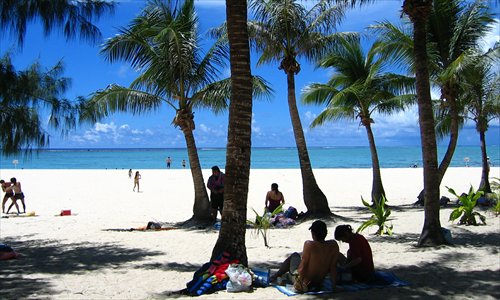HOME >> CHINA
Island paradise for babies
By Liang Chen Source:Global Times Published: 2014-2-20 22:38:01

People rest beneath coconut palms on a white sandy beach in Saipan. Photo: IC
Wang Xue (pseudonym), an expectant mother in Beijing, has been anxious lately. The baby is expected within six months, but as with real estate, location is everything when it comes to giving birth.
Like any expectant parent, she wants the best for her baby. She and her husband believe that giving her baby US citizenship might be the best gift they can bestow.
The couple has been considering Saipan, a tiny island in the Western Pacific Ocean, which is US territory.
"We have long planned to give birth to my baby in Saipan, but recently the agent told me that the island authorities are tightening policies to control the entry of the expectant mothers. I am so scared that we might be repatriated to China," Wang, a real estate agent, told the Global Times.
The US and Canada have long been the hottest destinations for expectant Chinese mothers to have babies. The US gives babies born on its soil US citizenship.
However, after immigration laws were tightened to control the influx of pregnant Chinese women in both countries, pregnant Chinese women have shifted to Saipan to obtain US citizenship for their new-born babies.
Saipan is just four hours away from China by plane. Local law states that Chinese tourists can stay for up to 45 days visa-free on the island.
The number of babies born to Chinese mothers has risen sharply, increasing 35 fold from just eight in 2009 to 282 in 2012, according to the Health and Vital Statistics office on the island. That means that 71 percent of babies born in Saipan are American-born Chinese, known in China as ABCs.
Easy as ABC
Being a US citizen has as many advantages: Once American-born children turn 21, they can theoretically support their parents' applications for US citizenship. American-born kids can take advantage of the US education system by paying lower fees for public universities, thus escaping the exam-oriented Chinese education system. It also means avoiding the pollution, dirty air and food safety problems that trouble many Chinese.
But this back-door to US citizenship may soon be shut.
"It has become more and more difficult to send expectant mothers to Saipan. Mothers have to enter the island before their bellies are obviously bulging. The immigration officers will repatriate you if they can see you're pregnant," a Fujian-based agent, who gave his surname as Li, told the Global Times.
Before, expectant women could board the island two to three months before the due date, but now they have to enter the island half a year before the due date, Li said.
Due to the growing risk of being rejected by the immigration office, the Global Times found several agents had cancelled packages for sending expecting mothers to Saipan. "The policy was changing and we thought it was risky," Huang Xixi, an agent from the JIIAA baby counseling service center, who claimed they have offices across China and have already helped more than 5,000 mothers to deliver babies in the US.
Normally, expectant mothers are required to accept training to ensure they pass through customs and successfully step foot on Saipan.
"We suggest pregnant mothers go to the island in winter when they can cover up bulging bellies with baggy overcoats," Li said.
It costs around 160,000 ($26,320) to 170,000 yuan to deliver a baby in Saipan. Li said they offer a full package including a plane ticket, accommodation in a two-or three-bedroom apartment or house, and all the citizenship paperwork for the new-born baby.
"The price for giving birth to a baby in Saipan is much cheaper than on the US mainland, and the living costs are much lower in Saipan, so more and more pregnant women are choosing to give birth to babies on the island," Li told the Global Times.
Risky trip
Some expectant parents choose to have babies on the island without assistance from agents. In a popular article written on a forum dedicated to having babies in Saipan, a Fujian mother who gave birth to a baby boy in Saipan in 2012 said her relatives in Saipan had helped her rent a house and deal with the paperwork, in addition to booking a room in the hospital, which saved her a lot of money.
She booked the airplane ticket by herself and had her relative rent a one-bedroom house, which in total cost her around $10,000 to have a baby.
Despite the fact that having babies in Saipan is attractive, there is the risk that expectant mothers will be repatriated to their home country at any minute.
A Shenzhen-based agency told the Beijing News, it is not the best option for Chinese to have a US-born baby, because the medical care in Saipan is not particularly advanced, with only one public hospital on the island. Chinese tourists can only stay on the island for 45 days and normally pregnant women have to stay on the island for at least three months, which means their stays are illegal.
There have also been concerns that if expectant Chinese mothers flock to Saipan to have babies, the immigration authorities might cancel the visa-free policy for Chinese tourists.
Posted in: Society